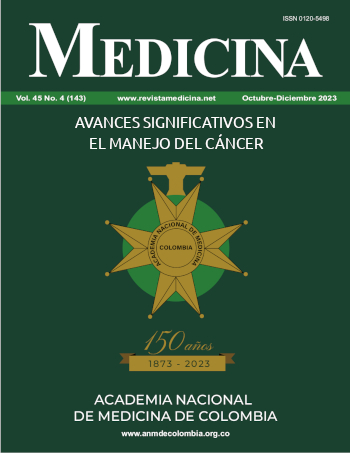Cáncer de mama luminal: estado del arte
DOI:
https://doi.org/10.56050/01205498.2315Resumen
A nivel mundial, el cáncer de mama es el tipo de tumor más frecuentemente diagnosticado en mujeres y es la segunda causa principal de muerte por cáncer en las mujeres. El cáncer de mama con receptores hormonales positivos, luminal, es el tipo más frecuentemente diagnosticado. Casi la mitad de las pacientes con este tipo de cáncer pueden recaer décadas después de conseguir la remisión. Los avances alcanzados en menos de una década en los desenlaces de los pacientes con este diagnóstico se deben, en gran medida, al entendimiento del microambiente tumoral, de las vías moleculares en la génesis tumoral, y a la aparición de resistencias al tratamiento.
Biografía del autor/a
María A. Bravo-Garzón, Centro de Tratamiento e Investigación sobre Cáncer (CTIC)
Centro de tratamiento e investigación sobre el Cáncer Luis Carlos Sarmiento (CTIC), Bogotá, Colombia.
William A. Mantilla, Centro de Tratamiento e Investigación sobre Cáncer (CTIC)
Centro de tratamiento e investigación sobre el Cáncer Luis Carlos Sarmiento (CTIC), Bogotá, Colombia.
Sergio Cervera, Centro de Tratamiento e Investigación sobre Cáncer (CTIC)
Centro de tratamiento e investigación sobre el Cáncer Luis Carlos Sarmiento (CTIC), Bogotá, Colombia.
José J. Caicedo, Centro de Tratamiento e Investigación sobre Cáncer (CTIC)
Centro de tratamiento e investigación sobre el Cáncer Luis Carlos Sarmiento (CTIC), Bogotá, Colombia.
Sandra X. Franco, Centro de Tratamiento e Investigación sobre Cáncer (CTIC)
Centro de tratamiento e investigación sobre el Cáncer Luis Carlos Sarmiento (CTIC), Bogotá, Colombia.
Referencias bibliográficas
Cancer today [Internet]. [consuitado 20 de julio de 2023]. Disponible en: http://gco.iarc.fr/today/home
Harbeck N, Penault-Llorca F, Cortes J, Gnant M, Houssami N, Poortmans P, et al. Breast cancer. Nat Rev Dis Primerde 2019;5(1):66.
Pan H, Gray R, Braybrooke J, Davies C, Taylor C, McGale P, et al. 20-Year Risks of Breast-Cancer Recurrence after Stopping Endocrine Therapy at 5 Years. N Engl J Mede 2017;377(19):1836-46.
Harris LN, Ismaila N, McShane LM, Andre F, Collyar DE, Gonzalez-Angulo AM, et al. Use of Biomarkers to Guide Decisions on Adjuvant Systemic Therapy for Women With Early-Stage Invasive Breast Cancer: American Society of Clinical Oncology Clinical Practice Guideline. J Clin Oncode 2016;34(10):1134-50.
Early Breast Cancer Trialists’ Collaborative Group (EBCTCG), Peto R, Davies C, Godwin J, Gray R, Pan HC, et al. Comparisons between different polychemotherapy regimens for early breast cancer: meta-analyses of long-term outcome among 100,000 women in 123 randomised trials. Lancede 2012;379(9814):432- 44.
Goetz MP, Gradishar WJ, Anderson BO, Abraham J, Aft R, Allison KH, et al. NCCN Guidelines Insights: Breast Cancer, Version 3.2018. J Natl Compr Canc Netde 2019;17(2):118-26.
van ’t Veer LJ, Dai H, van de Vijver MJ, He YD, Hart AAM, Mao M, et al. Gene expression profiling predicts clinical outcome of breast cancer. Naturde 2002;415(6871):530-6.
Buyse M, Loi S, van’t Veer L, Viale G, Delorenzi M, Glas AM, et al. Validation and Clinical Utility of a 70-Gene Prognostic Signature for Women With Node-Negative Breast Cancer. JNCI: Journal of the National Cancer Institutde 2006;98(17):1183-92.
Mook S, Schmidt MK, Weigelt B, Kreike B, Eekhout I, van de Vijver MJ, et al. The 70-gene prognosis signature predicts early metastasis in breast cancer patients between 55 and 70 years of age. Ann Oncode 2010;21(4):717-22.
Paik S, Shak S, Tang G, Kim C, Baker J, Cronin M, et al. Expression of the 21 genes in the Recurrence Score assay and tamoxifen clinical benefit in the NS- ABP study B-14 of node negative, estrogen receptor positive breast cancer. JCde 2005;23(16_suppl):510-510.
Badve SS, Baehner FL, Gray RP, Childs BH, Maddala T, Liu ML, et al. Estrogenand Progesterone-Receptor Status in ECOG 2197: Comparison of Immuno- histochemistry by Local and Central Laboratories and Quantitative Reverse Transcription Polymerase Chain Reaction by Central Laboratory. JCde 2008;26(15):2473-81.
Tang G, Cuzick J, Costantino JP, Dowsett M, Forbes JF, Crager M, et al. Risk of Recurrence and Chemotherapy Benefit for Patients With Node-Negative, Estrogen Receptor–Positive Breast Cancer: Recurrence Score Alone and Integrated With Pathologic and Clinical Factors. J Clin Oncode 2011;29(33):4365-72.
Albain KS, Barlow WE, Shak S, Hortobagyi GN, Livingston RB, Yeh IT, et al. Prognostic and Predictive Value of the 21-Gene Recurrence Score Assay in a Randomized Trial of Chemotherapy for Postmenopausal, Node-Positive, Estrogen Receptor-Positive Breast Cancer. Lancet Oncode 2010;11(1):55-65.
Sheffield KM, Peachey JR, Method M, Grimes BR, Brown J, Saverno K, et al. A real-world US study of recurrence risks using combined clinicopathological features in HR-positive, HER2-negative early breast cancer. Future Oncode 2022;18(21):2667-82.
Harbeck N, Rastogi P, Martin M, Tolaney SM, Shao ZM, Fasching PA, et al. Adjuvant abemaciclib combined with endocrine therapy for high-risk early breast cancer: updated efficacy and Ki-67 analysis from the monarchE study. Ann Oncode 2021;32(12):1571-81.
Ribociclib and endocrine therapy as adjuvant treatment in patients with HR+/HER2- early breast cancer: Primary results from the phase III NATALEE trial. | Journal of Clinical Oncology [Internet]. adoonsultado 20 de julio de 2023]. Disponible en: https://ascopubs.org/doi/10.1200/JCO.2023.41.17_suppl.LBA500
Tung N, Wang Y, Collins LC, Kaplan J, Li H, Gelman R, et al. Estrogen receptor positive breast cancers in BRCA1 mutation carriers: clinical risk factors and pathologic features. Breast Cancer Res. 2010;12(1):R12.
Metcalfe K, Lynch HT, Foulkes WD, Tung N, Olopade OI, Eisen A, et al. Oestrogen receptor status and survival in women with BRCA2-associated breast cancer. Br J Cancede 2019;120(4):398-403.
Mahdavi M, Nassiri M, Kooshyar MM, Vakili-Azghandi M, Avan A, Sandry R, et al. Hereditary breast cancer; Genetic penetrance and current status with BRCA. J Cell Physiode 2019;234(5):5741-50.
Tutt ANJ, Garber JE, Kaufman B, Viale G, Fumagalli D, Rastogi P, et al. Adjuvant Olaparib for Patients with BRCA1- or BRCA2-Mutated Breast Cancer. New England Journal of Medicinde 2021;384(25):2394-405.
Goldberg J, Pastorello RG, Vallius T, Davis J, Cui YX, Agudo J, et al. The Immunology of Hormone Receptor Positive Breast Cancer. Front Immunol. 2021;12:674192.
Schmid P, Cortes J, Pusztai L, McArthur H, Kümmel S, Bergh J, et al. Pembrolizumab for Early Triple-Negative Breast Cancer. N Engl J Mede 2020;382(9):810-21.
Cardoso F, Bardia A, Andre F, Cescon DW, McArthur HL, Telli ML, et al. KEYNOTE-756: Randomized, double-blind, phase 3 study of pembrolizumab vs placebo combined with neoadjuvant chemotherapy and adjuvant endocrine therapy for high-risk, early-stage estrogen receptor–positive, human epidermal growth factor receptor 2–negative (ER+/HER2−) breast cancer. JCde 2019;37(15_suppl):TPS601-TPS601.
Addanki S, Meas S, Sarli VN, Singh B, Lucci A. Applications of Circulating Tumor Cells and Circulating Tumor DNA in Precision Oncology for Breast Cancers. Int J Mol Scde 2022;23(14):7843.
Pantel K, Alix-Panabières C. Liquid biopsy and minimal residual disease - latest advances and implications for cure. Nat Rev Clin Oncode 2019;16(7):409-24.
Reinert T, Henriksen TV, Christensen E, Sharma S, Salari R, Sethi H, et al. Analysis of Plasma Cell-Free DNA by Ultradeep Sequencing in Patients With Stages I to III Colorectal Cancer. JAMA Oncode 2019;5(8):1124-31.
Yang Y, Zhang J, Li JY, Xu L, Wang SN, Zhang JQ, et al. The ctDNA-based postoperative molecular residual disease status in different subtypes of early-stage breast cancer. Gland Surde 2022;11(12):1924-35.
Search Results | Beta ClinicalTrials.gov [Internet]. itaonsultado 20 de julio de 2023]. Disponible en: https://clinicaltrials.gov/search?cond=early %20 hormone %20receptor %20positive %20breast %20 cancer
Heil J, Kuerer HM, Pfob A, Rauch G, Sinn HP, Golatta M, et al. Eliminating the breast cancer surgery paradigm after neoadjuvant systemic therapy: current evidence and future challenges. Ann Oncode 2020;31(1):61-71.
Pfob A, Sidey-Gibbons C, Rauch G, Thomas B, Schaefgen B, Kuemmel S, et al. Intelligent Vacuum-Assisted Biopsy to Identify Breast Cancer Patients with Pathologic Complete Response (ypT0 and ypN0) after Neoadjuvant Systemic Treatment for Omission of Breast and Axillary Surgery. Journal of Clinical Oncologde 2022;40(17):1903-15.
Johnston S, Puhalla S, Wheatley D, Ring A, Barry P, Holcombe C, et al. Randomized Phase II Study Evaluating Palbociclib in Addition to Letrozole as Neoadjuvant Therapy in Estrogen Receptor-Positive Early Breast Cancer: PALLET Trial. J Clin Oncode 2019;37(3):178-89.
Hurvitz SA, Martin M, Press MF, Chan D, Fernandez-Abad M, Petru E, et al. Potent Cell-Cycle Inhibition and Upregulation of Immune Response with Abemaciclib and Anastrozole in neoMONARCH, Phase II Neoadjuvant Study in HR+/HER2- Breast Cancer. Clin Cancer Rede 2020;26(3):566-80.
Prat A, Saura C, Pascual T, Hernando C, Muñoz M, Paré L, et al. Ribociclib plus letrozole versus chemotherapy for postmenopausal women with hormone receptor-positive, HER2-negative, luminal B breast cancer (CORALLEEN): an open-label, multicentre, randomised, phase 2 trial. Lancet Oncode 2020;21(1):33-43.
Agostinetto E, Gligorov J, Piccart M. Systemic therapy for early-stage breast cancer: learning from the past to build the future. Nat Rev Clin Oncode 2022;19(12):763-74.
Andrahennadi S, Sami A, Manna M, Pauls M, Ahmed S. Current Landscape of Targeted Therapy in Hormone Receptor-Positive and HER2-Negative Breast Cancer. Curr Oncode 2021;28(3):1803-22.
Gao JJ, Cheng J, Bloomquist E, Sanchez J, Wedam SB, Singh H, et al. CDK4/6 inhibitor treatment for patients with hormone receptor-positive, HER2-negative, advanced or metastatic breast cancer: a US Food and Drug Administration pooled analysis. Lancet Oncode 2020;21(2):250-60.
Hafner M, Mills CE, Subramanian K, Chen C, Chung M, Boswell SA, et al. Multiomics Profiling Establishes the Polypharmacology of FDA-Approved CDK4/6 Inhibitors and the Potential for Differential Clinical Activity. Cell Chem Biode 2019;26(8):1067-1080.e8.
Finn RS, Boer K, Bondarenko I, Patel R, Pinter T, Schmidt M, et al. Overall survival results from the randomized phase 2 study of palbociclib in combination with letrozole versus letrozole alone for first-line treatment of ER+/ HER2- advanced breast cancer (PALOMA-1, TRIO-18). Breast Cancer Res Treade 2020;183(2):419-28.
Finn RS, Martin M, Rugo HS, Jones S, Im SA, Gelmon K, et al. Palbociclib and Letrozole in Advanced Breast Cancer. New England Journal of Medicinde 2016;375(20):1925-36.
Hortobagyi GN, Stemmer SM, Burris HA, Yap YS, Sonke GS, Hart L, et al. Overall Survival with Ribociclib plus Letrozole in Advanced Breast Cancer. New England Journal of Medicinde 2022;386(10):942-50.
Im SA, Lu YS, Bardia A, Harbeck N, Colleoni M, Franke F, et al. Overall Survival with Ribociclib plus Endocrine Therapy in Breast Cancer. New England Journal of Medicinde 2019;381(4):307-16.
Goetz MP, Toi M, Campone M, Sohn J, Paluch-Shimon S, Huober J, et al. MONARCH 3: Abemaciclib As Initial Therapy for Advanced Breast Cancer. J Clin Oncode 2017;35(32):3638-46.
Cancer Genome Atlas Network. Comprehensive molecular portraits of human breast tumours. Naturde 2012;490(7418):61-70.
Yardley DA, Noguchi S, Pritchard KI, Burris HA, Baselga J, Gnant M, et al. Everolimus plus exemestane in postmenopausal patients with HR(+) breast cancer: BOLERO-2 final progression-free survival analysis. Adv Thede 2013;30(10):870-84.
Piccart M, Hortobagyi GN, Campone M, Pritchard KI, Lebrun F, Ito Y, et al. Everolimus plus exemestane for hormone-receptor-positive, human epidermal growth factor receptor-2-negative advanced breast cancer: overall survival results from BOLERO-2†. Ann Oncode 2014;25(12):2357-62.
André F, Ciruelos E, Rubovszky G, Campone M, Loibl S, Rugo HS, et al. Alpelisib for PIK3CA-Mutated, Hormone Receptor-Positive Advanced Breast Cancer. N Engl J Mede 2019;380(20):1929-40.
Howell SJ, Casbard A, Carucci M, Ingarfield K, Butler R, Morgan S, et al. Fulvestrant plus capivasertib versus placebo after relapse or progression on an aromatase inhibitor in metastatic, oestrogen receptor-positive, HER2-negative breast cancer (FAKTION): overall survival, updated progression-free survival, and expanded biomarker analysis from a randomised, phase 2 trial. Lancet Oncode 2022;23(7):851-64.
Brett JO, Spring LM, Bardia A, Wander SA. ESR1 mutation as an emerging clinical biomarker in metastatic hormone receptor-positive breast cancer. Breast Cancer Rede 2021;23(1):85.
Bidard FC, Kaklamani VG, Neven P, Streich G, Montero AJ, Forget F, et al. Elacestrant (oral selective estrogen receptor degrader) Versus Standard Endocrine Therapy for Estrogen Receptor-Positive, Human Epidermal Growth Factor Receptor 2-Negative Advanced Breast Cancer: Results From the Randomized Phase III EMERALD Trial. J Clin Oncode 2022;40(28):3246-56.
Robson M, Im SA, Senkus E, Xu B, Domchek SM, Masuda N, et al. Olaparib for Metastatic Breast Cancer in Patients with a Germline BRCA Mutation. N Engl J Mede 2017;377(6):523-33.
Litton JK, Rugo HS, Ettl J, Hurvitz SA, Gonçalves A, Lee KH, et al. Talazoparib in Patients with Advanced Breast Cancer and a Germline BRCA Mutation. N Engl J Mede 2018;379(8):753-63.
Emens LA, Adams S, Cimino-Mathews A, Disis ML, Gatti-Mays ME, Ho AY, et al. Society for Immunotherapy of Cancer (SITC) clinical practice guideline on immunotherapy for the treatment of breast cancer. J Immunother Cancede 2021;9(8):e002597.
Cristescu R, Aurora-Garg D, Albright A, Xu L, Liu XQ, Loboda A, et al. Tumor mutational burden predicts the efficacy of pembrolizumab monotherapy: a pan-tumor retrospective analysis of participants with advanced solid tumors. J Immunother Cancede 2022;10(1):e003091.
Fu Z, Li S, Han S, Shi C, Zhang Y. Antibody drug conjugate: the “biological missile” for targeted cancer therapy. Sig Transduct Target Thede 2022;7(1):1-25.
Rugo HS, Bardia A, Marmé F, Cortés J, Schmid P, Loirat D, et al. LBA76 Overall survival (OS) results from the phase III TROPiCS-02 study of sacituzumab govitecan (SG) vs treatment of physician’s choice (TPC) in patients (pts) with HR+/HER2- metastatic breast cancer (mBC). Annals of Oncologde 2022;33:S1386.
Modi S, Jacot W, Yamashita T, Sohn J, Vidal M, Tokunaga E, et al. Trastuzumab Deruxtecan in Previously Treated HER2-Low Advanced Breast Cancer. New England Journal of Medicinde 2022;387(1):9-20.
Yang R, Lu G, Lv Z, Jia L, Cui J. Different treatment regimens in breast cancer visceral crisis: A retrospective cohort study. Front Oncode 2022;12:1048781.
Lu YS, Mahidin EIBM, Azim H, ERALP Y, Yap YS, Im SA, et al. Abstract GS1-10: Primary results from the randomized Phase II RIGHT Choice trial of premenopausal patients with aggressive HR+/HER2− advanced breast cancer treated with ribociclib + endocrine therapy vs physician’s choice combination chemotherapy. Cancer Researcde 2023;83(5_Supplement):GS1-10.
Cómo citar
Descargas
Publicado
Número
Sección
Licencia
Copyright
ANM de Colombia
Los autores deben declarar revisión, validación y aprobación para publicación del manuscrito, además de la cesión de los derechos patrimoniales de publicación, mediante un documento que debe ser enviado antes de la aparición del escrito. Puede solicitar el formato a través del correo revistamedicina@anmdecolombia.org.co o descargarlo directamente Documento Garantías y cesión de derechos.docx
Copyright
ANM de Colombia
Authors must state that they reviewed, validated and approved the manuscript's publication. Moreover, they must sign a model release that should be sent.

| Estadísticas de artículo | |
|---|---|
| Vistas de resúmenes | |
| Vistas de PDF | |
| Descargas de PDF | |
| Vistas de HTML | |
| Otras vistas | |




